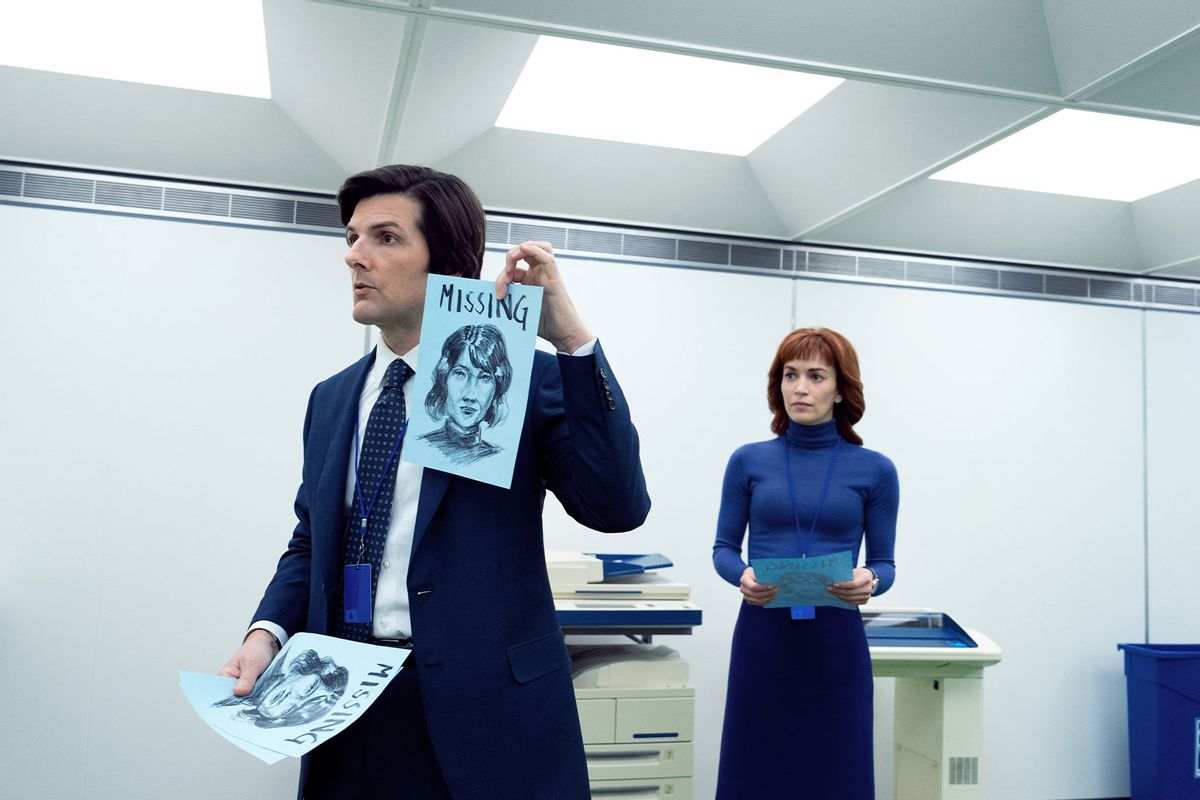Reddit is not a place I typically like to be, and lately, I’ve landed on a couple of important reasons why. On one hand, the posts on the forum site often come dangerously close to conspiracy for my taste. And on the other hand, I am exactly the kind of gullible bozo who’s liable to find himself up to his neck in those very conspiracies. Whether a user is speculating that Crumbl cookies is in cahoots with Big Pharma or hypothesizing about Troye Sivan being an old Victorian doll that came to life to make people gay — I am, unfortunately, very interested.
"Severance" is television made with both grand vision and minute intention, a multi-genre mystery that walks in step with the greats.
Because I am of weak will and feeble mind, I had to delete the Reddit app from my phone altogether a few weeks back. It wasn’t just because being prone to falling into Reddit holes is at odds with my goal to free myself from the prison of my phone in the new year; I deleted Reddit because I knew “Severance” Season 2 was right around the corner, and I wanted to preserve the watch experience for myself as much as possible. Maybe that’s a funny thing to say as a critic who could binge the whole season at will (and trust me, I know how completely obnoxious and haughty that sounds). But because I have to watch things for my job, I know how deeply dire the television landscape has become. Really, when was the last time a show was this delicious to savor from week to week?
“Severance” sets itself apart from the pack of by-the-numbers intrigue dramas not just because its production value is infinitely higher than most streaming shows, but because it actually seems to care about its story being an immersive experience for everyone watching. It’s television made with both grand vision and minute intention, a multi-genre mystery that walks in step with the greats like “Twin Peaks,” “Lost” and “Buffy the Vampire Slayer.” These were all shows whose writers knew how to keep viewers on the hook by giving them small tastes of the biggest secrets, with the occasional gulp of a major reveal. The second season of “Severance” has wasted no time doing the same. This season has unspooled a few new plotlines already, but it has also tied a few up and made major leaps toward answers to its largest riddles. In “Severance,” everything means something, and fans are gathering to study every microscopic detail to prepare themselves for what might be yet to come.
But perhaps you’re a casual watcher or haven’t yet been inducted into the Lumon Industries workforce. (If so, congrats on having way more resolve than most of us.) That might mean that you’re confused about why the show has become such a hyperfixation for viewers, but it’s really quite simple: “Severance” cares about its audience as much as it cares about the story it’s telling.
That story — about a man named Mark (Adam Scott) who leads a team of office workers whose minds have been surgically divided between their work selves and their personal selves — has been carefully constructed to fascinate fans from the jump. The show’s chilly atmosphere complements the icy stares of all of the non-severed employees at Lumon — that is, those who retain all of their memories whether they’re at work or not. Mark heads up the Macrodata Refinement (or MDR) team, which consists of Helly R. (Britt Lower), Dylan G. (Zach Cherry) and Irving B. (John Turturro). What MDR does exactly is just one of the show’s many mysteries. All we know is that the team sorts random numbers into boxes on their computers based on how the groups of numbers “feel.” We also know that Mark is preternaturally great at refining.
Want a daily wrap-up of all the news and commentary Salon has to offer? Subscribe to our morning newsletter, Crash Course.
But how do we know this exactly? There are some allusions to Mark’s skill in the show. At the end of Season 1, the “Innies” — the severed employees at Lumon — stage a coup of sorts that allows their work personalities to emerge outside of work hours. This throws whatever is at play at Lumon entirely out of whack and threatens the public’s already uncertain perception of the company. In Season 2’s first episode, we learn that Lumon is desperate to get Mark to return to work. According to his ex-boss Harmony Kobel (Patricia Arquette), who got the axe after the Innie coup, Mark is “the only person who can finish Cold Harbor.”
Ah, another layer of another mystery. What exactly Cold Harbor is isn’t entirely clear yet, either, but we do know it’s a major MDR project with implications that are above the Innies’ pay grade. But why is it only Mark who could finish work that seemingly any person with two functioning eyes and a brain could pull off? Well, Mark is a refinement whiz, and we know that not only because the writers imply it given how badly Lumon wants him back at work, but because there are details hidden in plain sight. A scene from Season 1 features mixed-down audio of Dylan G. telling Helly R. about Mark’s expertise. The vocal was buried beneath a voiceover track until it was isolated by a viewer and posted online. Where did this user post it? Take one guess.
 Adam Scott and Britt Lower in "Severance" (Apple TV+)
Adam Scott and Britt Lower in "Severance" (Apple TV+)
Reddit has become the premier source for all things “Severance.” Users have developed a shared way of talking about color and speech patterns, and use the shorthand of a lowercase letter to refer to Innies and Outies (iMark, OMark) with expediency. They’ve parsed meaning behind everything from a companion book written for the show to Easter eggs that the average viewer might not normally catch, not to mention oodles of speculation behind the goats that live in the bowels of Lumon’s severed floor. The forum features a deluge of fan theories, which users can upvote and discuss as episodes air. Some are wildly convoluted, while others are so plausible that it seems inevitable that they’ll be revealed in the show somewhere along the way. Given how many fan theories have already come to fruition, even ones that seem preposterous — like this theory about a deliberate connection to “The Office” — seem reasonable once you consider how much detail is embedded into every frame of the show.
It helps, of course, that the “Severance” writers are actually interested in details at all. Too many contemporary television shows give the impression of mystery and tout the alleged existence of multi-season, overarching plots. But when you look a little closer, all they really are is weird for weirdness’ sake.
The "Severance" writers have been so scrupulous because they want viewers to use their minds in ways that the streaming model has slowly discouraged. They don’t want the show to just exist, or be “content”; they want you to enjoy it.
Take “Yellowjackets,” a series that had an incredible first season because, like “Severance,” it understood how to use its talented ensemble cast to slowly dole out drama and intimate deeper mysteries along the way. Viewers followed a group of teenage girls who survived a plane crash and were forced to fend for themselves deep in the Canadian woods, as well as their adult counterparts in a future timeline, who are still dealing with the trauma of that harrowing experience. Season 1 of “Yellowjackets” implied that there were supernatural forces at play somewhere in that forest and that whatever power the girls came into contact with followed them through the decades. It was a brilliantly fresh amalgamation of thorny themes and plot points from hit shows of the past — until it fell apart.
Season 2 of “Yellowjackets” spun its wheels and spun out of control. From week to week, I hoped for the best and prayed that the show’s writers knew where they were headed, only for them to kill off the show’s most sympathetic character in the season finale, seemingly for nothing other than shock value. But the real unforgivable sin was that it all but abandoned the central mystery it so carefully built in the first season in favor of useless dream sequences and dead-end asides. I hadn’t seen a show fly off the rails that quickly in some time, and it often seemed like its writers were more intent on servicing the fandom who invested in the characters than the viewers who actually cared about where the show itself was headed. Watching people talk onscreen is not inherently interesting, especially when the dialogue exists to fill time instead of moving the plot forward.
While “Yellowjackets” is a more unique case, there are plenty of television shows that have had trouble figuring out how to keep a viewer’s attention. You’d think that would be easier, given that almost all modern series have truncated seasons, down from the 20+ episodes that your average television season used to have before streaming outmoded that model. But streaming presents its own problems that keep fans from getting the chance to invest their time and their minds into the show. Streaming shows either make all of their episodes available to watch at once — making theorizing completely unnecessary when you could simply keep watching to see what happens — or, they are made so quickly and written so haphazardly that any theorizing is a waste of time. There’s no use in spending your time contemplating a deeper meaning that doesn’t exist in the original text at all. That’s what fanfiction is for. A few days back, professor and historian Erik Baker joked that “‘Severance’ is succeeding by rediscovering the forgotten ancient knowledge that audiences enjoy it when things happen on the TV shows they watch.” Baker has a great point. “Severance” is so good because, like other notable television shows of the same ilk, it is meticulous. Even when it seems like nothing major is happening, and the actors are left to hold it down with their marvelous performances, the next week’s episode reveals that everything that happened in the previous installment actually had a purpose. While viewers had to wait three whole years for the second season to premiere, it has already been so worth the wait that I’d happily endure another three if it meant that this enjoyment could be found again, further down the line.
More than just giving viewers another way to enjoy “Severance,” its fan theories have emboldened its audience. The show’s writers have been so scrupulous because they want viewers to use their minds in ways that the streaming model has slowly discouraged. They don’t want the show just to exist, or be “content”; they want you to enjoy it. Netflix creates television that allows you to scroll on your phone while you watch its programming. “Severance” forces you to put your device down, or risk missing an integral detail that will enhance your enjoyment of the show tenfold. This series has moved beyond being merely another streaming TV show — it’s a springboard for viewer creativity. Maybe watercooler television is a thing of the past, but that doesn’t mean that the media we spend our time with should isolate us even further. Reddit might suck you into its theories for hours on end, but at least it’s bringing people together instead of pulling them apart.
Read more
about Season 2 of "Severance"



Shares